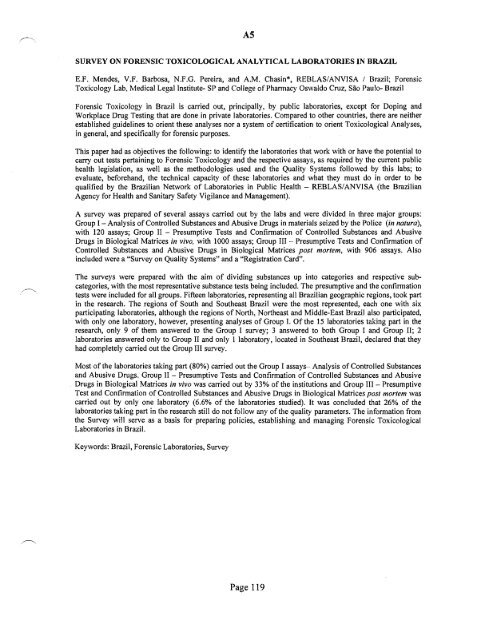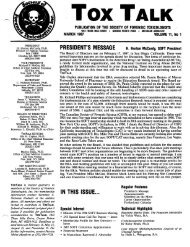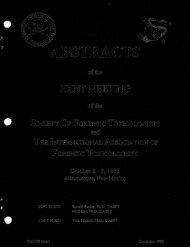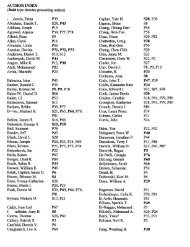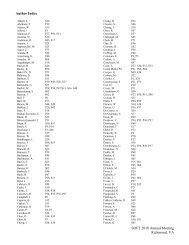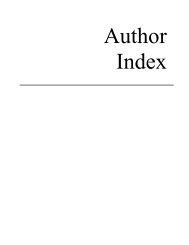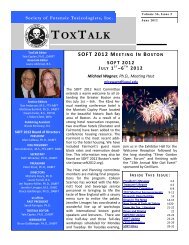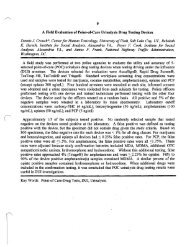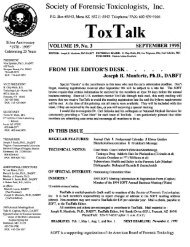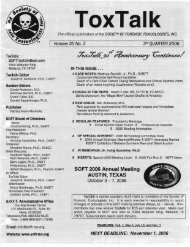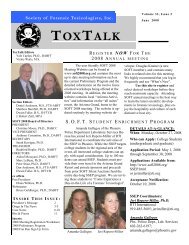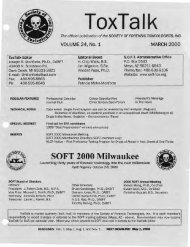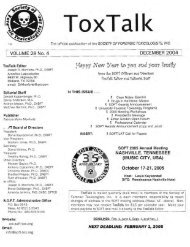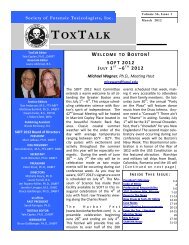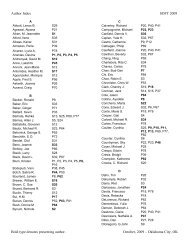SOFT 2004 Meeting Abstracts - Society of Forensic Toxicologists
SOFT 2004 Meeting Abstracts - Society of Forensic Toxicologists
SOFT 2004 Meeting Abstracts - Society of Forensic Toxicologists
Create successful ePaper yourself
Turn your PDF publications into a flip-book with our unique Google optimized e-Paper software.
AS <br />
SURVEY ON FORENSIC TOXICOLOGICAL ANALYTICAL LABORATORIES IN BRAZIL<br />
E.F. Mendes, V.F. Barbosa, N.F.G. Pereira, and A.M. Chasin*, REBLAS/ANVISA I Brazil; <strong>Forensic</strong><br />
Toxicology Lab, Medical Legal Institute- SP and College <strong>of</strong>Phannacy Oswaldo Cruz, Sao Paulo- Brazil<br />
<strong>Forensic</strong> Toxicology in Brazil is carried out, principally, by public laboratories, except for Doping and<br />
Workplace Drug Testing that are done in private laboratories. Compared to other countries, there are neither<br />
established guidelines to orient these analyses nor a system <strong>of</strong> certification to orient Toxicological Analyses,<br />
in general, and specifically for forensic purposes.<br />
This paper had as objectives the following: to identify the laboratories that work with or have the potential to<br />
carry out tests pertaining to <strong>Forensic</strong> Toxicology and the respective assays, as required by the current public<br />
health legislation, as well as the methodologies used and the Quality Systems followed by this labs; to<br />
evaluate, beforehand, the technical capacity <strong>of</strong> these laboratories and what they must do in order to be<br />
qualified by the Brazilian Network <strong>of</strong> Laboratories in Public Health REBLAS/ANVISA (the Brazilian<br />
Agency for Health and Sanitary Safety Vigilance and Management).<br />
A survey was prepared <strong>of</strong> several assays carried out by the labs and were divided in three major groups:<br />
Group I - Analysis <strong>of</strong> Controlled Substances and Abusive Drugs in materials seized by the Police (in natura),<br />
with 120 assays; Group II - Presumptive Tests and Confinnation <strong>of</strong> Controlled Substances and Abusive<br />
Drugs in Biological Matrices in vivo, with 1000 assays; Group III Presumptive Tests and Confirmation <strong>of</strong><br />
Controlled Substances and Abusive Drugs in Biological Matrices post mortem, with 906 assays. Also<br />
included were a "Survey on Quality Systems" and a "Registration Card".<br />
The surveys were prepared with the aim <strong>of</strong> dividing substances up into categories and respective subcategories,<br />
with the most representative substance tests being included. The presumptive and the confinnation<br />
tests were included for all groups. Fifteen labpratories, representing all Brazilian geographic regions, took part<br />
in the research. The regions <strong>of</strong> South and Southeast Brazil were the most represented, each one with six<br />
participating laboratories, although the regions <strong>of</strong> North, Northeast and Middle-East Brazil also participated,<br />
with only one laboratory, however, presenting analyses <strong>of</strong> Group I. Of the 15 laboratories taking part in the<br />
research, only 9 <strong>of</strong> them answered to the Group I survey; 3 answered to both Group I and Group II; 2<br />
laboratories answered only to Group II and only 1 laboratory, located in Southeast Brazil, declared that they<br />
had completely carried out the Group III survey.<br />
Most <strong>of</strong> the laboratories taking part (80%) carried out the Group I assays- Analysis <strong>of</strong> Control led Substances<br />
and Abusive Drugs. Group II Presumptive Tests and Confirmation <strong>of</strong> Controlled Substances and Abusive<br />
. Drugs in Biological Matrices in vivo was carried out by 33% <strong>of</strong> the institutions and Group III - Presumptive<br />
Test and Confirmation <strong>of</strong> Controlled Substances and Abusive Drugs in Biological Matrices post mortem was<br />
carried out by only one laboratory (6.6% <strong>of</strong> the laboratories studied). It was concluded that 26% <strong>of</strong> the<br />
laboratories taking part in the research still do not follow any <strong>of</strong> the quality parameters. The infonnation from<br />
the Survey will serve as a basis for preparing policies, establishing and managing <strong>Forensic</strong> Toxicological<br />
Laboratories in Brazil.<br />
Keywords: Brazil, <strong>Forensic</strong> Laboratories, Survey<br />
Page 119


